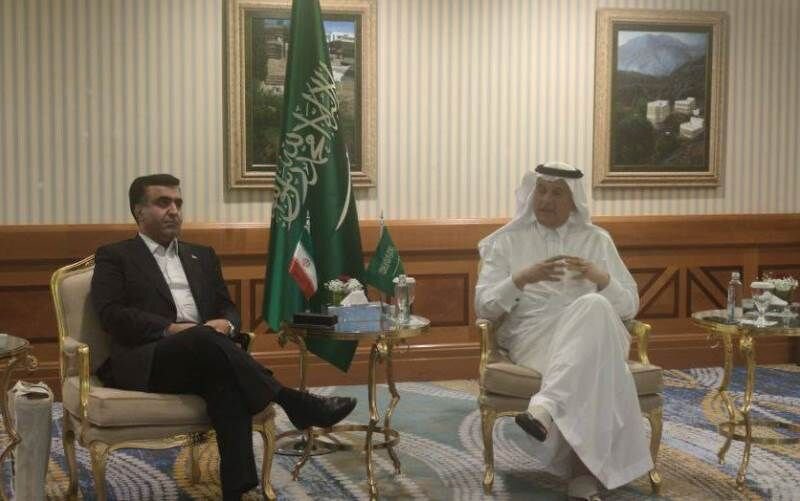ROPME, Kuwait Regional Convention key to protect Persian Gulf environment, Iran says

TEHRAN - Ali Salajeqeh, head of the Department of Environment, in a meeting with his Saudi counterpart, Abdulrahman al-Fadley, proposed the cooperation of the Regional Organization for the Protection of the Marine Environment (ROPME) and Kuwait Regional Convention for Co-operation on the Protection of the Marine Environment from Pollution to protect the Persian Gulf environment.
The officials met on the sidelines of the Conference of Environment Ministers in the Islamic World, held by Saudi Arabia on October 19.
The Persian Gulf has been severely polluted as many oil tankers and pipes pass through the sea, Salajeqeh said, the DOE website reported.
The main and most sensitive stations of this region, i.e. aquatics and water sources, have been badly affected by these pollutions.
Salajeqeh went on to say, "Despite the cruel sanctions imposed on Iran, we are witnessing the significant growth of scientific technologies in the country.”
He added that modern technologies have made it possible for us to successfully improve various environmental indicators in the country.
In this regard, more than 2000 knowledge-based companies have been established by Iranian youths in different fields, which provide suitable capacity for the development of mutual relations.
Iran and Saudi Arabia can collaborate in various environmental fields, particularly climate change the outcomes of which can bring the two countries even closer.
“We did hold two regional and international meetings relating to environmental issues, especially sand and dust storms within a year,” Salajeqeh stated.
These meetings were highly welcomed by regional countries and international forums, he said, adding that many countries participated in these international conferences and a declaration was issued.
Collaboration with neighboring countries can play a focal role in the implementation of the resolutions of these conferences, including the creation of a regional environmental organization, a regional environmental fund, and a convention to combat sand and dust storms in the United Nations, which needs your cooperation.
Considering the valuable experiences of the two countries, as well as many old universities and colleges, skillful professors and scientists in this field, and knowledge-based companies can work together to solve the regional problems.
Environmental issues have become increasingly intense and demand immediate solutions, Iran accepts Saudi Arabia’s proposal to create a working group.
ROPME convention
ROPME was established in Kuwait in 1979 and was quickly ratified by seven member states (Iran, Bahrain, Iraq, Oman, Qatar, Saudi Arabia, and the United Arab Emirates).
The main objective of ROPME is to coordinate efforts of the eight Member States towards protecting the marine and coastal environment and ecosystems in the ROPME Sea Area against marine pollution and stressors that might be induced by developmental activities or/and other drivers of change.
Kuwait regional convention
Adopted in Kuwait on April 24, 1978, by Bahrain, Iran, Iraq, Kuwait, Oman, Qatar, Saudi Arabia, and the United Arab Emirates, the Kuwait Regional Convention for Co-operation on the Protection of the Marine Environment from Pollution aims to prevent, abate and combat pollution of the marine environment in the region.
Persian Gulf ecosystem at risk
The Persian Gulf has an area of about 241,000 square kilometers. Its length is some 990 km, and its width varies from a maximum of about 340 km to a minimum of 55 km in the Strait of Hormuz.
There are tens of international conventions and protocols to protect the Persian Gulf marine environment, however, despite the fact that the Persian Gulf is of utmost importance economically, environmentally, and socially for the littoral cities, there is no collective effort to safeguard its marine life.
Some 60 percent of the world's oil reserves are in the Persian Gulf, and by building oil platforms and complexes, and refineries around it, we have provided the ground for the entry of oil, chemicals, and sewage into the water.
More than 10,000 ships pass through the Persian Gulf and the Sea of Oman annually, 75 percent of which are related to the transportation of crude oil and petroleum products.
The discharge of various waste materials such as engine washing water, sewage, and ship balance water has exacerbated the pollution in the Persian Gulf.
Carbon footprint is another damage done to aquatic environments, so the more carbon the water absorbs, the more acidic it becomes.
The results of an 8-year study show that changes in the pH of the aquatic environment have led to complex changes in the food chain and cause damage to aquatic animals whose exoskeleton is made of carbonates, such as starfish, oysters, and butterflyfish, and results in the instability of the shells of these organisms.
In recent years, the increase in water temperature in the Persian Gulf, along with the tensions caused by unstable development activities in the important water area, both on the north coast and especially on the part of the southern neighbors who have less adherence to the principles of environmental protection, have caused significant damages to the corals of the Persian Gulf.
MT/MG
Leave a Comment